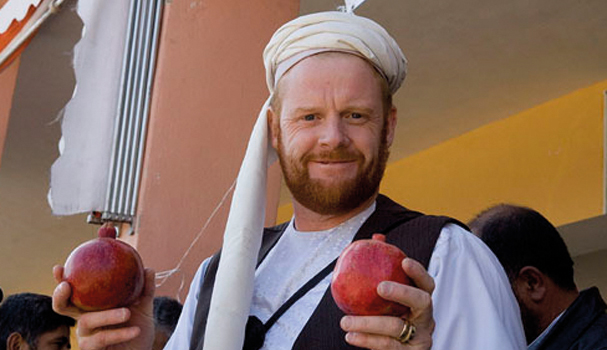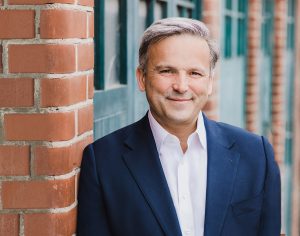For many people, Afghanistan is a no-go zone. But for James Brett, founder of Plant for Peace, the war-torn country provides the backdrop for what looks set to become one of the UK’s biggest ethical imports this year.
“I visited northern Pakistan in October 1999 whilst importing furniture into the UK,” Brett begins. “It was there I drank pomegranate juice for the first time from a street stall. As soon as I tasted it, I turned to a friend who was with me and said ‘I’m gonna make a drink from this.’ I didn’t know anything about the food and drinks industry, I just knew it needed to be done.”
Brett returned to the UK and investigated how the juice industry worked, from shipping to packaging. Having sought investment from friends, PomeGreat was founded and launched into a number of major UK retailers in 2004 – the first pomegranate juice drink in the UK and Europe. “PomeGreat went from a thought in the street in Pakistan in 1999 to turning over £30m plus in 2007.”
The overnight success of PomeGreat was overwhelming but a few months following the launch, Brett found thoughts of his past catching up with him.
As a child, Brett had been abused by his grandfather and he told his parents of the abuse a year after it had stopped. “My mother took it the worst. Three months later, she jumped off the roof of a multi-story car park and killed herself.”
Over the years, his mother’s death took its toll on Brett. “I became dysfunctional,” he says. “I got mixed up with the wrong crowd and found myself in and out of and mental health hospitals and prisons.”
Whilst in a psychiatric hospital, Brett says, his shares in PomeGreat were diluted as he was ousted from the company – and there was little he could do. “I was the CEO and major shareholder in the company, but unfortunately my lawyer advised that it would cost in the region of £100,000 to pursue the case in court. I was neither mentally, or financially, prepared to do that.”
Following his discharge from the psychiatric hospital in 2006, Brett sought counselling for child sexual abuse and found himself on the way to full recovery.

That same year, Brett contacted Dr. Julia Wright, deputy director of the Centre for Agroecology and Food Security, to express his interest in an article she’d written online and was invited to speak at a seminar she had arranged in Kandahar in front of Afghani farmers. Brett, having met an Afghani shipping agent during his time spent importing furniture from the region in 1999, contacted him and asked if he could provide a translator for the duration of his trip. The agent sent his son along to translate for him.
Upon landing in Afghanistan, the reality of its main export was soon realised. There was a sea of red and white poppies, with farmers harvesting opium as they drove along. “My life flashed before my eyes,” Brett says.
“I’d previously lost two of my best friends to drug-related deaths – one at 19 and the other at 24 – both buried in the same church grounds as my mum,” he continues. “At that moment, I thought about the power of the pomegranate and what impact harvesting fruit instead of poppies could have.”
When returning to the airport a few days later, Brett passed the same poppy fields and it was at this time instinct kicked in. “I asked to stop off at a shop in Kabul. I went in and bought a piece of white cardboard and a marker pen. I asked to be driven back to an opium field.”
Much to his translator and driver’s dissatisfaction, he exited the vehicle and ran into a nearby field. “I approached a confused-looking farmer and told him about pomegranates through my translator,” Brett recalls. “I asked about his life, told him about mine and we talked about heroin in the west. It was then that I asked him if he wanted to grow pomegranates, rather than poppies, with me.”
“I told him I’d support him if he agreed, which he did,” Brett continues. “I asked him to give me two months; if he didn’t hear from me within that time, I wouldn’t be able to do anything. I held up the placard and got my translator to take a photo.” The words on the card read: ‘pomegranate is the answer’.
Locals caught wind of the odd situation, as did a local TV station, and word began to spread. Brett starred on TV stations around the world, including BBC World News and CNN, attracting not only the attention of farmers wanting to help to harvest pomegranates on hundreds of hectares of land, but also some prominent dignitaries.
As tribal gatherings with Afghan elders were arranged for Brett to attend, the number of interested farmers grew to 5.5 million – a staggering 20% of the population. A strategy was required, but it wasn’t forthcoming. “I didn’t have a plan – I was just going through the motions. I knew what I had to do, but I didn’t know how to deliver on it,” he remarks.
In 2008, Brett was contacted by the US embassy and the US Agency of International Development (USAID), both of which had seen him on television burning a stockpile of 13 tonnes of opium in Afghanistan.
Following discussions, USAID agreed to fund the planting of 100,000 pomegranate trees, which took place in Nandahar during February 2009. USAID also donated $500,000 to arrange further gatherings that saw more farmers join the strategy. More people caught wind of Brett’s plight including Renu Mather, philanthropic entrepreneur and founder of Fortune Forum – a company that matches good causes up with billionaires.

Fast-forward a couple of years and the situation had blossomed. Throughout 2010 and 2011, a string of coincidences had enabled Brett to meet the dignitaries that had watched, until them, from afar. One such person was Sir William McAlpine, whose wife thought up the name Brett adopted for his foundation: Plant for Peace.
In order to raise further funding for the Plant for Peace Foundation, it was agreed to establish a commercial arm, which is where the idea for fruit bars came into play. “I spent a year and a half attempting to turn pomegranates into a natural, powdered format that allowed for 25% to 40% of pure pomegranate to go straight into the bars,” says Brett. “If we were to use pomegranate juice rather than powder in the bars, we would only be able to use up to around 6% of pomegranate owing to problems with moisture, which is the majority of other fruit bars can only allow small amounts of real fruit in them.”
In order to continue funding the corporate entity and get the fruit bars made, Plant for Peace has since approached and offered shares to individual private investors. The company’s plan is then to approach larger groups and organisations when it is fully functioning, at which point the share price would have logically increased for the early investors. One of Plant for Peace’s aims is to be similar to Fair Trade produce, only in conflict zones.
The fruit bars are scheduled to make their way onto Waitrose’s shelves by September of this year; other supermarkets, including Sainsbury’s, will also be stocking them following the initial rollout. Ben & Jerry’s is also set to release ice cream containing ‘peace pieces’ and, in the first year, they will be using the equivalent of 1 million fruit bars with a view to ordering more. “These are the sort of companies that Plant for Peace needs to partner with to be able to really utilise another nation’s produce on an international scale,” Brett says.
Prince Charles has also expressed interest. “I’ve had a couple of meetings with him and he seems really excited about the whole thing,” Brett reveals. “I went to Balmoral and Highgrove and he’s fully supportive of everything that’s taking place and is ready to help as soon as he sees a little more progress. What’s more, Brett recently attended meetings with the ‘big five’ Hollywood studios to discuss purchasing the rights to his powerful story and transferring it to the big screen.
Despite the glitz and glamour, Brett hasn’t forgotten his true objective. “Since I ran into that opium field, the one thing I’ve realised is that a journey has to be travelled. All these different things on the periphery of that journey – such as movies and media or whatever else – they’re all ingredients for making Plant for Peace successful, so we can deliver the methodology of helping communities experiencing post-conflict conditions globally.” ![]()
Share via:









































